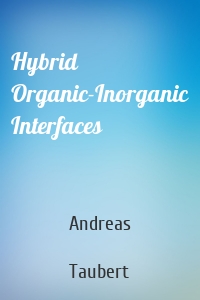Andreas Taubert
1 кн.
Hybrid Organic-Inorganic Interfaces
Hybrid organic-inorganic materials and the rational design of their interfaces open up the access to a wide spectrum of functionalities not achievable with traditional concepts of materials science. This innovative class of materials has a major impact in many application domains such as optics, electronics, mechanics, energy storage, and conversion, protective coatings, catalysis, sensing, and nanomedicine. The properties of these materials do not only depend on the chemical structure, and the...
| Автор | Andreas Taubert |


